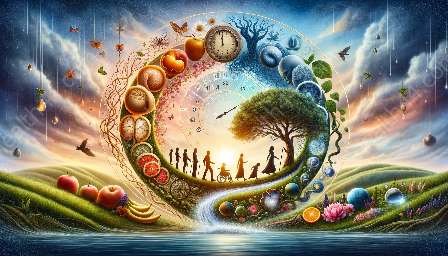Menopause is a natural phase in a woman's life that marks the end of her reproductive years. It is characterized by several physical and emotional changes that can significantly impact her overall well-being. This comprehensive guide explores the topic of menopause, its relationship with reproductive health and aging, and provides valuable insights into managing this transition.
What is Menopause?
Menopause is a normal and natural biological process that occurs in women usually between the ages of 45 and 55. It is defined as the point in time when a woman has not had her menstrual period for 12 consecutive months. At this stage, the ovaries stop releasing eggs, and the production of estrogen and progesterone hormones decline, leading to the end of the reproductive years.
Stages of Menopause
Menopause is often preceded by a transitional phase called perimenopause, during which a woman may experience irregular menstrual cycles and various menopausal symptoms. This can last for several years before menopause is officially reached. After menopause, a woman enters postmenopause, which continues for the rest of her life.
Menopausal Symptoms
The hormonal changes during menopause can trigger a wide range of symptoms that may affect a woman's physical and emotional well-being. Common symptoms include hot flashes, night sweats, vaginal dryness, mood swings, sleep disturbances, and changes in libido. These symptoms can vary in intensity and duration for each individual.
Impact on Reproductive Health
Menopause signals the end of a woman's ability to conceive naturally. The decline in estrogen production can also lead to changes in the reproductive organs, such as thinning of the vaginal tissues and decreased lubrication. These changes may result in discomfort during sexual intercourse and an increased risk of urinary tract infections.
Reproductive Health in Relation to Aging
As women age, their reproductive health undergoes significant changes. The decline in fertility, onset of menopause, and potential health concerns such as osteoporosis and heart disease become important considerations. It is crucial for women to prioritize their reproductive health as they age and seek appropriate medical guidance to manage these changes.
Managing Menopause
While menopause is a natural process, its symptoms can impact a woman's quality of life. There are several treatment options available to help manage menopausal symptoms, including hormone replacement therapy (HRT), lifestyle modifications, and alternative therapies. It is important for women to consult healthcare professionals to find the most suitable approach for their individual needs.
Conclusion
Menopause is a significant phase in a woman's life that requires understanding, support, and the right medical guidance. By understanding the impact of menopause on reproductive health and aging, women can effectively navigate this transition and prioritize their overall well-being. With the right knowledge and resources, women can embrace this new phase of life with confidence and empowerment.


